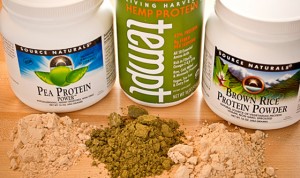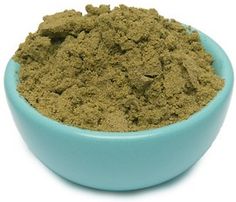There are currently more vegan protein powder options than ever before, due to a surge in demand over the past 5 years or so.
Which powder is best? What are the benefits of one powder over another? Is it beneficial to mix different types of vegan protein together? These are just a few of the questions that will be answered in this short blog post.
Although we only carry sprouted brown rice, hemp, and pea protein isolate at our online store, other options exist.
Now let’s take a look at the most common powders available, and their benefits, drawbacks, and unique traits.
Brown Rice
Quite a few brown rice protein powder options are available. We prefer sprouted brown rice protein that is between 80-90% protein because it offers the most from a nutritional perspective.
Benefits: Reasonable price, high bioavailability (easy for the body to use), easy to source, allergen free. Good amino acid profile.
Drawbacks: Can be a chalky texture and hard to mix. Strong flavour that may not appeal to all.
What to look out for: Protein made from organic / sprouted brown rice is an ideal choice as it offers the best nutritional properties and is relatively reasonably priced.
Hemp
Although hemp powder only contains only around 50% protein compared to 80-90% for most other vegetable proteins, it has a few beneficial nutritional traits that other powders don’t offer.
1 – It is an excellent source of fibre (around 4g per tablespoon)
2 – It contains 21 amino acids, and all of the essential ami
no acids (required by the body from diet).
3 – It contains omega-3 fatty acids
Benefits: A clean source of protein (hemp can be grown
with little to no pesticides conventionally). Contains all 21 essential amino acids. High in fibre. Contains omega 3’s.
Drawbacks: Low protein content per serving compared to other options.
What to look out for: Try to find a hemp powder that is at least 50% protein. You may find that the least expensive powders contain as little as 30%.
Soy
Soy is one of the most inexpensive sources of vegetable protein available, but the majority of soy products on the market are made from genetically modified soy beans. This makes it difficulty to know if the product you are buying is truly GMO Free.
In addition, studies have shown that the consumption of soy protein may have a negative influence on hormone levels in the body.
Benefits: Inexpensive, easy to source, relatively mild flavour.
Drawbacks: May be GMO. May have a negative affect on hormone levels in the body.
What to look out for: If not 100% certified organic, is almost guaranteed to be derived from genetically modified soy beans.
Yellow Pea
Relatively inexpensive and extremely easy for the body to absorb. over the last two years pea protein has exploded in popularity.
Benefits: Price, high bioavailability, easy to source, often over 90% protein. Mild flavour.
Drawbacks: Quality varies – read nutritional profiles carefully.
What to look out for: Most pea protein is non-GMO but make sure it is listed on the label. Look for a product that is over 90% protein.
Vegan Blends
Blending vegetable proteins is beneficial because it allows you to derive the individual benefits  of each powder. For example, combining hemp protein with brown rice protein would add some omega 3’s, and help diversify the amino acid profile of the powder.
of each powder. For example, combining hemp protein with brown rice protein would add some omega 3’s, and help diversify the amino acid profile of the powder.
Some blends even include other unconventional sources of protein like chia.
Benefits: Price, high bioavailability, easy to source, often over 90% protein.
Drawbacks: Cost.
What to look out for: Look for a high quality non-GMO (preferably organic) product that has all-natural ingredients and no fillers.
Conclusion
Generally we recommend avoiding soy protein as it is more difficult to digest than other sources of vegetable proteins, and often contains GMO’s.
Brown rice protein and pea protein are our two top picks if you are looking for the highest amount of pure protein per serving, but don’t rule out hemp!
Alternate between powder, or blend different types of vegetable protein to increase the amino acid diversity and decrease the risk of developing food sensitivities.
What is your favourite vegan protein powder? Please let us know by leaving a comment below!


